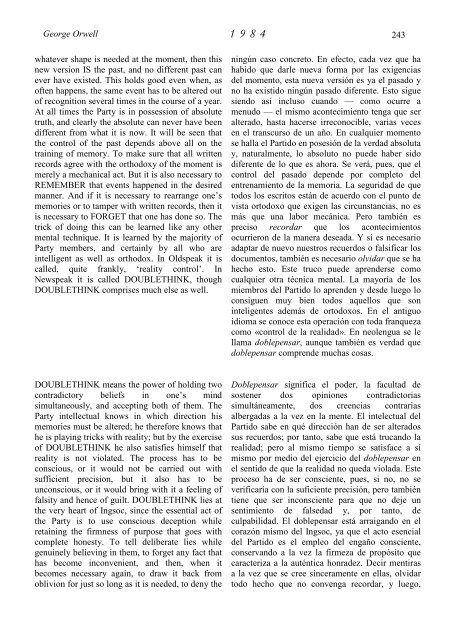You also want an ePaper? Increase the reach of your titles
YUMPU automatically turns print PDFs into web optimized ePapers that Google loves.
George Orwell 1 9 8 4<br />
whatever shape is needed at the moment, then this<br />
new version IS the past, and no different past can<br />
ever have existed. This holds good even when, as<br />
often happens, the same event has to be altered out<br />
of recognition several times in the course of a year.<br />
At all times the Party is in possession of absolute<br />
truth, and clearly the absolute can never have been<br />
different from what it is now. It will be seen that<br />
the control of the past depends above all on the<br />
training of memory. To make sure that all written<br />
records agree with the orthodoxy of the moment is<br />
merely a mechanical act. But it is also necessary to<br />
REMEMBER that events happened in the desired<br />
manner. And if it is necessary to rearrange one’s<br />
memories or to tamper with written records, then it<br />
is necessary to FORGET that one has done so. The<br />
trick of doing this can be learned like any other<br />
mental technique. It is learned by the majority of<br />
Party members, and certainly by all who are<br />
intelligent as well as orthodox. In Oldspeak it is<br />
called, quite frankly, ‘reality control’. In<br />
Newspeak it is called DOUBLETHINK, though<br />
DOUBLETHINK comprises much else as well.<br />
DOUBLETHINK means the power of holding two<br />
contradictory beliefs in one’s mind<br />
simultaneously, and accepting both of them. The<br />
Party intellectual knows in which direction his<br />
memories must be altered; he therefore knows that<br />
he is playing tricks with reality; but by the exercise<br />
of DOUBLETHINK he also satisfies himself that<br />
reality is not violated. The process has to be<br />
conscious, or it would not be carried out with<br />
sufficient precision, but it also has to be<br />
unconscious, or it would bring with it a feeling of<br />
falsity and hence of guilt. DOUBLETHINK lies at<br />
the very heart of Ingsoc, since the essential act of<br />
the Party is to use conscious deception while<br />
retaining the firmness of purpose that goes with<br />
complete honesty. To tell deliberate lies while<br />
genuinely believing in them, to forget any fact that<br />
has become inconvenient, and then, when it<br />
becomes necessary again, to draw it back from<br />
oblivion for just so long as it is needed, to deny the<br />
243<br />
ningún caso concreto. En efecto, cada vez que ha<br />
habido que darle nueva forma por las exigencias<br />
del momento, esta nueva versión es ya el pasado y<br />
no ha existido ningún pasado diferente. Esto sigue<br />
siendo así incluso cuando — como ocurre a<br />
menudo — el mismo acontecimiento tenga que ser<br />
alterado, hasta hacerse irreconocible, varias veces<br />
en el transcurso de un año. En cualquier momento<br />
se halla el Partido en posesión de la verdad absoluta<br />
y, naturalmente, lo absoluto no puede haber sido<br />
diferente de lo que es ahora. Se verá, pues, que el<br />
control del pasado depende por completo del<br />
entrenamiento de la memoria. La seguridad de que<br />
todos los escritos están de acuerdo con el punto de<br />
vista ortodoxo que exigen las circunstancias, no es<br />
más que una labor mecánica. Pero también es<br />
preciso recordar que los acontecimientos<br />
ocurrieron de la manera deseada. Y si es necesario<br />
adaptar de nuevo nuestros recuerdos o falsificar los<br />
documentos, también es necesario olvidar que se ha<br />
hecho esto. Este truco puede aprenderse como<br />
cualquier otra técnica mental. La mayoría de los<br />
miembros del Partido lo aprenden y desde luego lo<br />
consiguen muy bien todos aquellos que son<br />
inteligentes además de ortodoxos. En el antiguo<br />
idioma se conoce esta operación con toda franqueza<br />
como «control de la realidad». En neolengua se le<br />
llama doblepensar, aunque también es verdad que<br />
doblepensar comprende muchas cosas.<br />
Doblepensar significa el poder, la facultad de<br />
sostener dos opiniones contradictorias<br />
simultáneamente, dos creencias contrarias<br />
albergadas a la vez en la mente. El intelectual del<br />
Partido sabe en qué dirección han de ser alterados<br />
sus recuerdos; por tanto, sabe que está trucando la<br />
realidad; pero al mismo tiempo se satisface a sí<br />
mismo por medio del ejercicio del doblepensar en<br />
el sentido de que la realidad no queda violada. Este<br />
proceso ha de ser consciente, pues, si no, no se<br />
verificaría con la suficiente precisión, pero también<br />
tiene que ser inconsciente para que no deje un<br />
sentimiento de falsedad y, por tanto, de<br />
culpabilidad. El doblepensar está arraigando en el<br />
corazón mismo del Ingsoc, ya que el acto esencial<br />
del Partido es el empleo del engaño consciente,<br />
conservando a la vez la firmeza de propósito que<br />
caracteriza a la auténtica honradez. Decir mentiras<br />
a la vez que se cree sinceramente en ellas, olvidar<br />
todo hecho que no convenga recordar, y luego,


